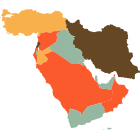Analysis of the Contextual Risks and Conflict Dynamics Anticipated to Impact the Implementation of NCD Programmes in Lebanon
Background:
In partnership with the Lebanese Red Cross (LRC), the Danish Red Cross (DRC) launched a project in Lebanon, generously supported by the Novo Nordisk Foundation. The initiative aimed to address the challenges posed by non-communicable diseases (NCDs) in the region. LRC, renowned for its neutrality and established humanitarian access, had been in a bilateral partnership with DRC since 2013. Their collaboration primarily focused on providing health support, psychosocial assistance, and cash-based aid to Syrian refugees and vulnerable host communities.
DRC’s involvement in NCD interventions was driven by practical needs identified in their operations, guided by small-scale pilot projects that applied evidence-based approaches. These NCD efforts predominantly centered on community-based prevention and care. Through a network of volunteers, the project promoted healthy lifestyles, facilitated testing and care for at-risk groups, and provided patient education and support. This new project, spanning the years 2021 to 2024, had a dual focus. It primarily targeted individuals displaced by the protracted Syrian conflict, with a special emphasis on the youth demographic. Furthermore, the project sought to enhance community-based prevention and care while offering essential health services to those at risk of severe NCD-related conditions. By engaging both governmental bodies and the broader humanitarian community in Lebanon, the project aimed to enhance the delivery of NCD care to the specified target groups. It also aimed to foster youth empowerment and ensure readiness to respond effectively to evolving needs in the event of escalating crisis scenarios in Lebanon. The Lebanese situation since October 2019, marked by nationwide protests and a severe economic crisis, introduced new risks and exacerbated existing difficulties. These challenges affected both Syrian refugees and vulnerable Lebanese populations, impacting their livelihoods, food security, and access to healthcare, including mental health and psychosocial wellbeing. Economic pressures also strained the public health sector as a growing number of people could not afford out-of-pocket expenses for essential health services and medications.
The recent COVID-19 pandemic further heightened uncertainties in the country, negatively affecting the economy and disproportionately impacting individuals with chronic conditions like NCDs. Lebanon’s already stretched healthcare system faced additional strain due to the pandemic. Amid this uncertainty and a range of potential scenarios, there was a crucial need to ensure flexible operational strategies capable of addressing evolving needs. To achieve this adaptability and responsiveness, a comprehensive risk analysis, including scenario planning and contingency plans, was deemed essential.
Triangle’s Assessment:
- Risk Analysis: The assessment involved a comprehensive examination of risks in the Lebanese context. This encompassed an evaluation of security, economic, political, societal, and humanitarian factors, as well as an assessment of the healthcare system’s capacity concerning NCD care.
- Scenario Development: Three scenarios (most likely, 2nd most likely, worst case) spanning 2020-2024 were developed. These scenarios considered the aforementioned risks and included mitigation measures and contingency plans tailored to the project’s requirements.
- Monitoring Plans: Plans for monitoring risks and triggers were established for each scenario, ensuring flexibility and adaptability in project operations.
- Scope: The assessment included document reviews, interviews, and workshops with key stakeholders. Interviews and workshops were primarily conducted via Skype due to the prevailing situation.
- Methodology: The assessment utilized best practices for scenario building, considering security, economic, political, societal, and humanitarian factors. Probability assessments for each scenario were based on plausibility analysis, followed by a comprehensive risk analysis, including the identification of indicators, triggers, and impact assessments.
- Micro-Scenarios: In addition to the primary scenarios, micro-scenarios or “black swan” events were considered, accounting for unlikely but highly impactful events.
- Outcome: The assessment aimed to provide a holistic understanding of the risks and challenges associated with NCD care in Lebanon. This enabled DRC to develop effective mitigation measures, contingency plans, and strategies for monitoring and implementation based on different scenarios.
- The assessment’s insights contributed to informed decision-making in the concluded project, ensuring DRC’s ability to respond effectively to changing needs amid complex and uncertain circumstances in Lebanon.
Project:
Analysis of the Contextual Risks and Conflict Dynamics Anticipated to Impact the Implementation of NCD Programmes in Lebanon

Duration:
April 2021
Lebanon
